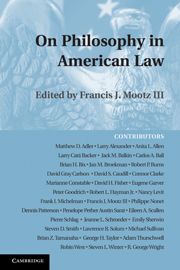Book contents
- Frontmatter
- Contents
- Introduction
- PART I KARL LLEWELLYN AND THE COURSE OF PHILOSOPHY IN AMERICAN LAW
- PART II PHILOSOPHICAL PERSPECTIVES ON LAW
- PART III AREAS OF PHILOSOPHY AND THEIR RELATIONSHIP TO LAW
- PART IV PHILOSOPHICAL EXAMINATIONS OF LEGAL ISSUES
- PART V LAW, RHETORIC, AND PRACTICE THEORY
- PART VI QUESTIONING THE RELATIONSHIP BETWEEN PHILOSOPHY AND AMERICAN LAW
- PART VII COMMENTARIES
- 32 Optimism and Pessimism in American Legal Philosophy
- 33 This Jurisprudential Moment
- 34 Fresh Looks, Philosophy-in-Action, and American Law
- Contributors and Selected Bibliography
- Name Index
- References
33 - This Jurisprudential Moment
Published online by Cambridge University Press: 31 July 2009
- Frontmatter
- Contents
- Introduction
- PART I KARL LLEWELLYN AND THE COURSE OF PHILOSOPHY IN AMERICAN LAW
- PART II PHILOSOPHICAL PERSPECTIVES ON LAW
- PART III AREAS OF PHILOSOPHY AND THEIR RELATIONSHIP TO LAW
- PART IV PHILOSOPHICAL EXAMINATIONS OF LEGAL ISSUES
- PART V LAW, RHETORIC, AND PRACTICE THEORY
- PART VI QUESTIONING THE RELATIONSHIP BETWEEN PHILOSOPHY AND AMERICAN LAW
- PART VII COMMENTARIES
- 32 Optimism and Pessimism in American Legal Philosophy
- 33 This Jurisprudential Moment
- 34 Fresh Looks, Philosophy-in-Action, and American Law
- Contributors and Selected Bibliography
- Name Index
- References
Summary
5. The “true” world – an idea which is no longer good for anything, not even obligating – an idea which has become useless and superfluous – consequently, a refuted idea: let us abolish it!
(Bright day; breakfast; return of bon sens and cheerfulness; Plato's embarrassed blush; pandemonium of all free spirits.) (Nietzsche 1968: 485–6)Jay Mootz's aim for this project, according to an early description provided to the contributors, is to “capture the ‘moment’ in legal philosophy.” The thirty-three essays responding to Mootz's call to “a diverse group of people” for papers that “mimic Llewellyn's audacity in describing the relationship between philosophy and law in ten pages in a period of great ferment,” present the commentator with a difficult task. Although the actual contributors are on the whole largely affiliated with law schools, their calls on and relations to philosophy run the gamut in terms of tone and involvement. Yet despite their differences and their individual shortcomings, or perhaps because of them, the essays together indeed reveal something of the moment, of its struggles and contradictions. That they show rather than capture this jurisprudential moment says something itself about contemporary philosophy and its possibilities in law.
In keeping with the overall aim of the volume and with Karl Llewellyn's own 1934 commentary “On Philosophy in American Law,” the commentary that follows constitutes a provocation.
- Type
- Chapter
- Information
- On Philosophy in American Law , pp. 279 - 284Publisher: Cambridge University PressPrint publication year: 2009



